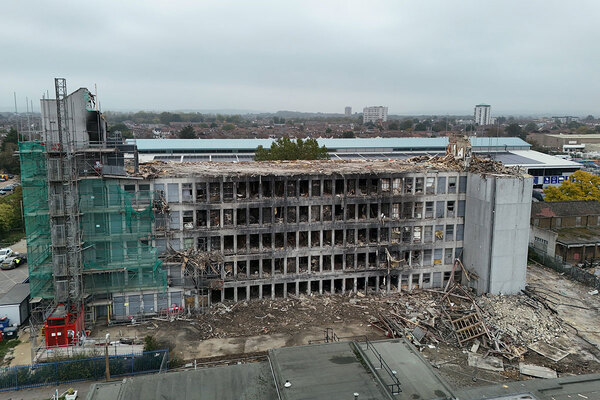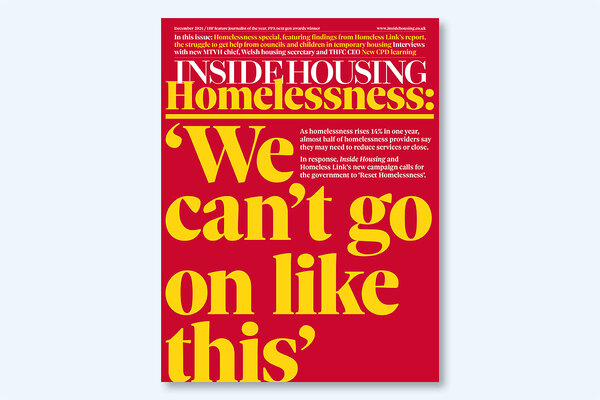The right response
Recent violent events across the country, and the debates following them, has made me question what our role as a sector is, should be, or could be, in a wider socio-economic context.
I welcome The Riot Report that is being worked on by Inside Housing, the Chartered Institute of Housing and the National Housing Federation, and hope that it can help to achieve some fundamental change to the socio-economic conditions that negatively impact upon thousands our residents and many more people living outside of social housing.
Over the past decade or so many social landlords have embarked upon a diverse range of initiatives, such as employment and community cohesion initiatives, aimed at tackling the wider socio-economic problems that exist across many social housing areas – as a sector we have shown ourselves to be proactive and rooted in meeting the needs of the communities we operate in.
However, this approach has seemingly attracted an acceptance over the years that housing organisations are somehow responsible for these issues where they affect tenants and should provide services increasingly as part of mainstream services.
When did it become part of a landlord’s job to tackle unemployment? Whilst we should be commended for responding to the needs of our residents and communities, our contribution to this national problem is not properly recognised or valued, and I believe we could have much more impact that we currently do, starting off with the following:
The underlying economic cause of poverty
Firstly, I believe that this country needs to accept the root cause of ingrained poverty. My view is that is economic, (whilst not disputing that this may also be compounded by other causes of poverty).
After many years working in some of the most deprived neighbourhoods in the country, combined with academic study of the issues, I firmly believe that long-term, intergenerational unemployment that characterises deprived (and I don’t mean all) social housing areas is the root of ingrained poverty. I directly attribute this to national economic decisions that were made in the 1980s and that have been upheld ever since.
This is not simply ‘harking back’; it must be accepted that the same areas that were affected back then are the same areas that are classed as amongst the country’s ‘most deprived’ today, and featured heavily in the recent riots. This is not a coincidence or merely a ‘local matter’. These areas were once ‘working’, it is the national economic system that has failed them and continues to do so; people have right to a job that has been increasingly denied for three decades.
Successive regeneration initiatives targeted at such areas have systematically failed to do what they set out to do at their core. I argue that they have ultimately failed because they were not established to tackle this structural cause of poverty and were largely set up, funded, and evaluated around predominately local solutions and causes.
Whilst there is much that can be done at the local level, and many new economic models may and probably should emerge locally, the overriding national economic policy priority for growth must be considered. I would argue that this priority has been to the active detriment of the areas we now seem to accept as deprived. National economic factors must be included as part of any investigations into the causes of current civil unrest and in preventing future episodes.
This line of argument about the causes of poverty may seem strange in the current climate of blaming individuals or entire communities for problems, but I believe that that approach is far too simplistic, inadequate and merely upholds the poverty status quo. I’m a believer in treating the cause not just managing the symptoms (although the housing sector does the latter very well).
What the housing sector can do
Secondly, I therefore believe one of the most important things we could do as a sector is to use our grassroots evidence and history to pull together a strong platform to lobby the wider socio-economic policies that ultimately affect thousands of our residents nationally.
After all, if there are decades of no jobs, insecure jobs, and poorly paid jobs in concentrated geographical areas we know the consequences, we deal with them every day, but instead of playing this role quietly under the radar is now not the time to step up to the national plate and challenge these long-held assumptions about the areas and people who live in them?
I would argue it is, especially in this climate of severe public sector cuts and a lingering recession making it even less likely that people living in these areas will gain employment.
However, I don’t think we are clear on whether we all want to operate in this wider field. Some may want to remain a traditional landlord and leave these issues to others.
Do we need to debate this? Do we need to look at our ‘sector’ and define it for our changing society? Do we want to define not just the landlord services we provide but the wider socio-economic services we provide (and could provide), that add value to people’s quality of life and save Government spending?
I believe one of our great strengths is the diverse organisations we have in our sector but I think that we need to work smarter together. We play an increasingly unique part in society: we operate at street level with many people who state institutions cannot reach, and we are also able to influence strategic discussions, Local Strategic Partnerships being a prime example.
And I think we can do more. I think we can build on the above and I would like to see us have a co-ordinated approach to identifying the real issues, the real causes, and real solutions that will serve to influence the national socio and particularly economic policies that so severely impact upon our residents’ quality of life.
We have the grassroots knowledge, the breadth of geographical coverage, and above all the commitment to social well-being as our guiding business ethos. We can play our part in helping to ensure that the socio-economic conditions that help to explain, if not justify, the recent riots across the country are not forgotten about in the rush to condemn and punish.
Carla Keegans, head of involvement and policy development at the City of London, is a member of Inside Housing, the Chartered Institute of Housing and the National Housing Federation’s The Riot Report sounding board.
In June she won Inside Housing and the Chartered Institute of Housing’s Rising Stars competition to find the future leaders of the housing sector.







